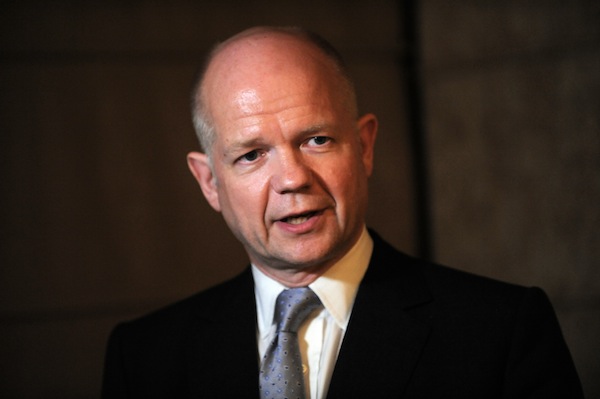William Hague is keeping his options open on Syria: not just on what the response will be to last week’s chemical weapons attack, but on whether (and how) Parliament will be consulted on any intervention. What is clear is that there will be some form of response, regardless of whether the United Nations Security Council unites over what that response is. Hague said:
‘So, is it possible to act on chemical weapons, is it possible to respond to chemical weapons without complete unity on the UN Security Council? I would argue, yes it is. Otherwise, of course, it might be impossible to respond to such outrages, such crimes and I don’t think that is an acceptable situation.
‘It is possible to take action based on great humanitarian need and humanitarian distress, it’s possible to do that under many different scenarios. I’ve pointed that out in Parliament over recent months before, but again, anything we propose to do on this, the strong response that we’ve talked about, whatever form that takes, will be subject to legal advice, must be in accordance with international law so I can be very clear about that.’
He also refused to ‘rule anything in or out’ on the different options that could be used as part of the response. And on consulting Parliament, the Foreign Secretary was similarly vague, giving only an indication that this could happen:
‘That will depend on the timing and nature of what we propose to do. We have a good record on consulting Parliament, having a vote in Parliament if we decide to take any military action and, of course, we’re conscious of the views of Parliament on these matters and the need to be consulted, so we’re very conscious of that but our decisions on that will depend on the timing and nature of what we propose to do.’
But as I reported last night, MPs are quite keen for Hague and colleagues to be as clear as they possibly can with Parliament as soon as they possibly can. Some might dismiss this as MPs being rather grandiose about their role when the international situation is moving quickly. But the reason Douglas Carswell, Sarah Wollaston, Labour’s frontbench and others are so adamant that there should be a recall is they see Parliament as the chosen representative of the British public, not simply some grand supper club where issues are debated. A failure to recall would signal, in their eyes, contempt for the public, not simply a desire to keep pesky MPs from making the decisions even messier.







Comments